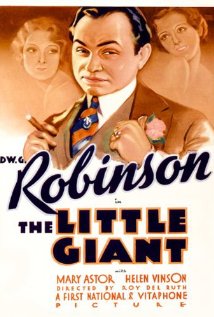
THE LITTLE GIANT
US, 1933, 76 minutes, Black-and-white.
Edward G. Robinson, Mary Astor, Helen Vinson, Russell Hopton.
Directed by Roy Del Ruth.
The Little Giant is a very entertaining gangster film, most unexpected in its way, of 1933. Audiences were already accustomed to say Edward G. Robinson as a gangster, especially in a classic role, Little Caesar. This time he is another Little…
The film opens with documentary material about the election Franklin D.Roosevelt as president of the United States, defeating Herbert Hoover. Statistics are given of the states and the news that the new president is likely to abolish Prohibition.
Robinson portrays gangster, Bugs Ahearn, acknowledged throughout the US as the Beer King. Reading the signs of the times, he announces that he is withdrawing from bootlegging, much to the surprise of his men and paying them off, except from a friend from school days, Al (Russell Hopton). Bugs wants to go upmarket, has been drinking Greek philosophy (Pluto’s Republic!), buying modernist and futurist paintings, learning French. Because they have no passports, they cannot go to Europe so decide to go to Santa Barbara.
Most of the film is comedy with Bugs trying to do upmarket, from his origins in the gutter, but trying to achieve class, despite so many wrong remarks. Bugs plays golf, buys a mansion, tries to play polo, and falls in love with a seemingly rich heiress – only to find that her family are confidence types, persuading him to buy a bankrupt company. However, he meets a nice young lady, Mary Astor in one of her sympathetic roles rather than a vamp, who finally reveals the truth – and, of course, was rehearsing with her to propose to the heiress, so now he proposes to her.
The situations are amusing, the dialogue also amusing – and the surprise that Al replies that he hasn’t seen a modernist picture like the one Bugs points out since he gave up cocaine! – and this in 1932.
1. Warner Brothers and their many gangster films of the time? The background of bootlegging? This film as a comic variation, and a sendup of the limitations of the gangsters?
2. Edward G. Robinson, adept planning gangsters, his being Little Caesar – now being The Little Giant?
3. Warner Brothers values, production, Chicago settings, the club, the contrast with Santa Barbara, the wealthy hotel, mansions, golf courses, polo grounds, Los Angeles and big business? The musical score?
4. The title, Bug’s club, Bugs himself?
5. The opening, the information about the 1932 election, the victory of Roosevelt, the defeat of Hoover, the possibility of the end of Prohibition? Bugs hearing the news, his instant decision, his men and their dismay, giving the money, his own nest egg, remaining friendly with Al? Saying goodbye to Edith and giving her money? The woman coming to warn him and giving her money to buy cigar? The confrontation with the other gangsters, the punch out, his proving he was not being pushed out of town?
6. Not able to go to Europe, no passports? The advertisement for Santa Barbara? The decision to go, the money, the clothes? Yet the origins in the gutter? Thug action? Slang? Arrival at the hotel, admiration of the room, the cost, turning on the taps to get his money’s worth? Mingling, nobody speaking, Al and is wishing he was elsewhere? Bugs and his eye on Polly?
7. Persuaded to go to San Francisco, the runaway horse, finding Polly, taking her home, the invitation to tea, going to the tailor, pressurising him, Polly’s brother hearing that Bugs was a millionaire, the tailor checking on his financial accounts?
8. The Cass family, no money, disreputable, coming on to Bugs, inviting him out, his deciding to buy the mansion? Meeting Ruth, the tour of the house, the decision to rent, her information about the servants, his employing them?
9. The dinner, Ruth organising everything, his keeping her to explain his situation, her not telling the truth about the Cass family, the rehearsal of the proposal?
10. The decision to play polo, getting the outfits, buying the horses, awkwardness, yet scoring the goal?
11. Going to Los Angeles, the board meeting, the run on the company, crooks? His acquiring the company? Ruth telling him the truth, about her house and her family? His phoning the thugs, their coming from Chicago, the list of the stockholders, the range of threats, the stockholders buying the company back? His having the money – but realising that he is a fish out of water and giving the company to someone else? The response of the police?
12. Confronting the family, getting his ring back, giving it to the blind man in the street, his thugs playing polo, and happy ending with Ruth?